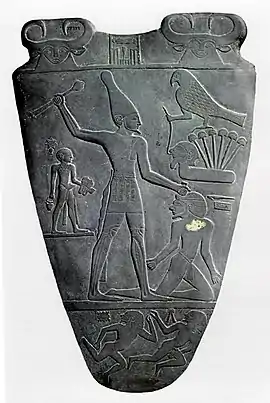Herneith
Herneith was a Queen consort of ancient Egypt. She lived during the 1st Dynasty. The name Herneith means "The face of Neith".
| Herneith | |||||
|---|---|---|---|---|---|
| Queen consort of Egypt | |||||
| Burial | Possibly Tomb 3507 in Saqqara | ||||
| Spouse | Pharaoh Djer or Anedjib | ||||
| |||||
| Dynasty | 1st dynasty of Egypt | ||||
| Religion | Ancient Egyptian religion | ||||
| Herneith [1] in hieroglyphs |
|---|
Documents
In the tomb of Herneith in Saqqara her name is found scratched on a vase, while in Abydos the name is found written together with the name of Djer.[2] However, the interpretation of their names written together remains controversial and it is not even certain that Herneith refers to a woman, and thus to a queen.
Biography
It is not known who Herneith's parents were. She is thought to be a queen of Djer but there is no conclusive evidence. Tyldesley suggests Herneith as a possible mother of Den, but it is more commonly thought that Merneith was his mother.[1][3]
Grajetzki mentions that even though Herneith is known from her tomb in Saqqara and her name is found together with signs that may refer to her role as a queen, confidently interpreting this information has proven difficult. If the interpretations are correct, Herneith may have held the titles of "The First One" and "Consort of the Two Lords".[4]
A large tomb in Saqqara (tomb S3507) is thought to belong to Herneith. Inscriptions on vases found in the tomb mention King Djer, King Den and King Qa'a. The tomb is a mudbrick mastaba. However, a pyramid-like mound was found within the structure, covered with brick. This combination of mastaba and grave mound represents a combination of Northern (mastaba) and Southern (grave mound) tomb architecture.[1]
Literature
- Walter B. Emery: Great Tombs of the First Dynasty III. London 1958, S. 73–97.
References
- J. Tyldesley, Chronicle of the Queens of Egypt, 2006, Thames & Hudson
- Emery: Great Tombs III , page 94
- Aidan Dodson & Dyan Hilton: The Complete Royal Families of Ancient Egypt. Thames & Hudson, 2004, ISBN 0-500-05128-3
- W.Grajetzki, Ancient Egyptian Queens: a hieroglyphic dictionary Golden House Publications, pg. 2
